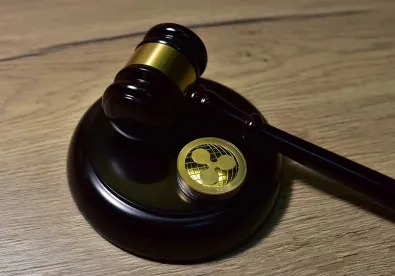On February 14, 2022, the U.S. Securities and Exchange Commission (SEC) entered a consent order (the Order) against BlockFi Lending LLC.(1) In the novel action, the SEC found that BlockFi failed to register the offers and sales of a crypto lending product, BlockFi Interest Accounts (BIAs). The Order found that this conduct violated the registration and antifraud provisions of the Securities Act and the Investment Company Act of 1940. In order to settle the matter, BlockFi agreed to pay a $50 million civil penalty and cease its unregistered offers and sales of the BIAs.
BlockFi Interest Accounts and the Order
The SEC’s investigation focused on BlockFi’s BIAs, lending products that allowed investors to lend their crypto assets to BlockFi in exchange for monthly interest payments. The monthly interest payment varied, but BlockFi offered interest rates as high as nine percent on digital assets deposited into the BIAs. On its website, BlockFi represented that the borrowed digital assets were then being lent to institutional investors or invested in “SEC-regulated equities and predominantly CFTC-regulated futures,” which offered a mutually beneficial return for BlockFi and investors. The Order stated that BlockFi “pooled the loaned assets, and exercised full discretion over how much to hold, lend, and invest. BlockFi had complete legal ownership and control over the loaned crypto assets, and advertised that it managed the risks involved.”
According to the Order, the BIAs were unregistered securities and constituted investment contracts under the Howey and Reves tests. The four-part Howey test is the foundational test for interpreting whether a product is subject to registration as a security, and it requires (1) the investment of money; (2) in a common enterprise; (3) with an expectation of profits; (4) derived solely through the efforts of others. In the Order, the SEC also applied the Reves test when considering whether the digital asset lending product is a “note” requiring registration. In Reves v. Ernst & Young, the Supreme Court of the United States (the “Supreme Court”) rejected the Howey test for analyzing notes. Instead, the Supreme Court applied a two-step analysis to determine whether a financial product was a “note” that was subject to registration. The Supreme Court first looked at whether the financial product was exempt from registration by examining judicially created categories previously exempted. If the financial product was not exempted, the Supreme Court considered four factors to determine whether the product had a strong “family resemblance” to a judicially created exemption: The Supreme Court considered (1) the motivation for entering the transaction; (2) the distribution plan; (3) the investing public’s reasonable expectations; and (4) whether any risk-reducing factors existed that rendered application of the securities laws unnecessary.
Applying the Howey and Reves tests, the SEC found that BlockFi offered BIAs as both “investment contracts” and “notes.”(2) The SEC stated that BlockFi allowed investors to invest their digital assets in a BIA, and investors could reasonably expect to profit from such investment.(3) The SEC determined that this arrangement satisfied the Howey test.(4) Further, the SEC considered BIAs to be “notes” satisfying the Reves test because the BIAs generated revenue for BlockFi through its lending and investment activities, and they were offered to the investing public.(5) Also, there were no other risk-reducing factors, such as another law or regulation protecting investors, that would render the application of the securities laws unnecessary.(6) As such, the SEC determined that the BIAs were notes and therefore securities.
Impact of the SEC Order
The BlockFi settlement appears to provide sought-after regulatory guidance in a burgeoning industry. For example, BlockFi CEO Zac Prince stated that, in accordance with the new regulatory clarity, the company intends to offer an “SEC-registered crypto interest bearing security, which will allow clients to earn interest on their crypto assets.”(7) In a press release accompanying the Order, Director of the SEC’s Division of Enforcement, Gurbir S. Grewal, stated that crypto industry participants “should take immediate notice of today’s resolution and come into compliance with the federal securities laws.”(8)
FOOTNOTES
-
SEC Order, Admin. Proc. No. 3-20758, at 2 (Feb. 14, 2022), available at https://www.sec.gov/litigation/admin/2022/33-11029.pdf.
-
SEC Order, Admin. Proc. No. 3-20758, at 2.
-
Id. at 8.
-
Id.
-
Id.
-
Id.
-
Kollen Post and Frank Chapparo, With $100 million settlement confirmed, BlockFi aims to register Yield with SEC, The Block (Feb. 14, 2022), available at https://www.theblockcrypto.com/linked/134165/with-100-million-settlement-confirmed-blockfi-aims-to-register-yield-with-sec.
-
Press Release, U.S. Secs. & Exch. Comm’n, BlockFi Agrees to Pay $100 Million in Penalties and Pursue Registration of its Crypto Lending Product (Feb. 14, 2022), available at https://www.sec.gov/news/pressrelease/2022-26.



 />i
/>i

